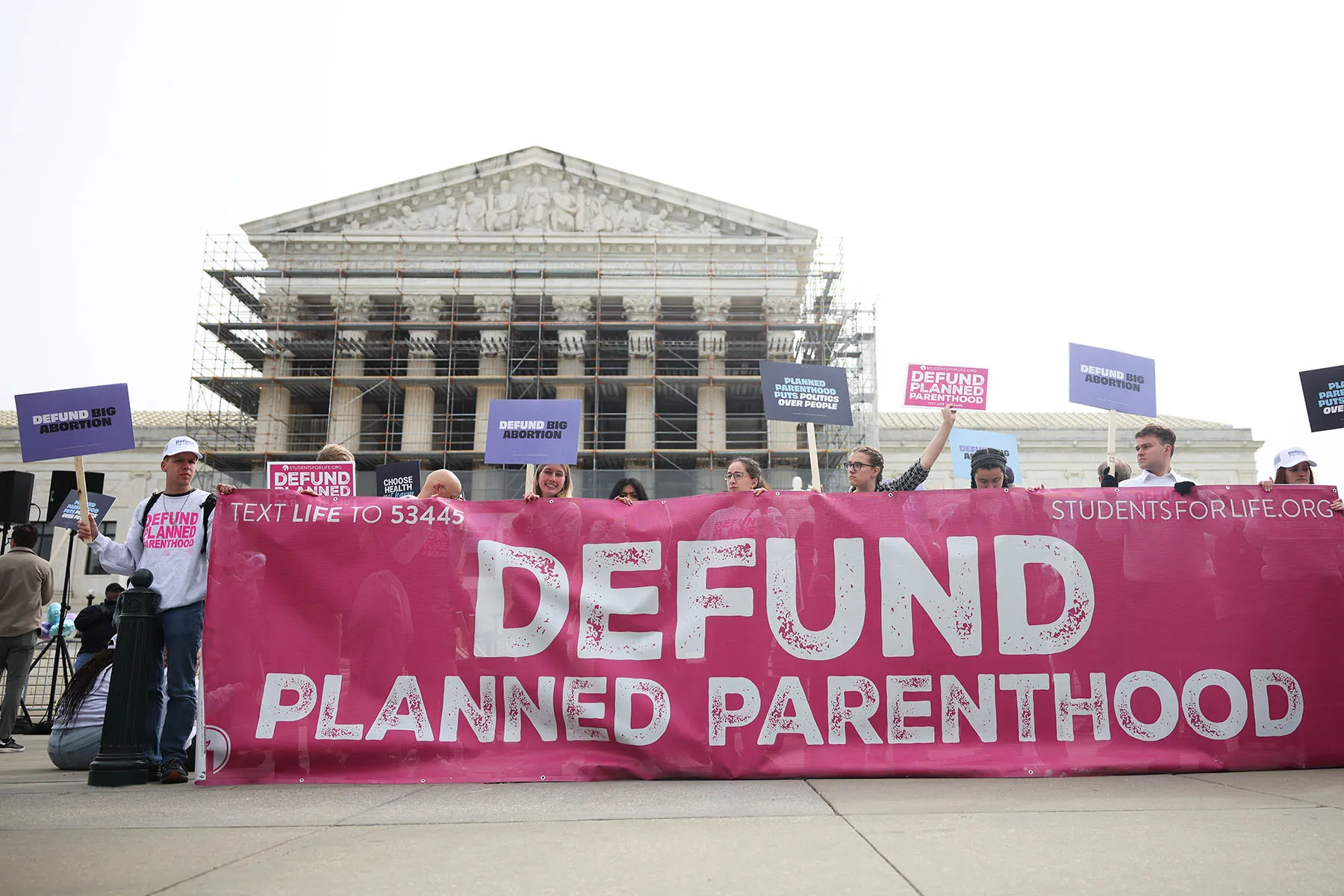When President Donald Trump signed into law a massive spending bill that bans Planned Parenthood from receiving federal Medicaid funds for a year, the influential anti-abortion group SBA Pro-Life America called it “the greatest pro-life victory” since the end of Roe v. Wade.
But this was not the “victory” they had laid out, even if conservatives have pushed to defund Planned Parenthood for years. Since the loss of federal abortion rights, many anti-abortion groups have championed a national ban on the procedure, which, after considering a 15-week proposal, Trump said on the campaign trail he would not sign.
During Trump’s second term, those same groups, citing the president’s disinterest, have backed away from pushing for a new law that would ban abortion. But by adopting more piecemeal efforts — cuts to Planned Parenthood and restrictions on when and how abortion medications can be administered — they have developed an approach that could still make abortion far more difficult to obtain without the same political costs as an unpopular ban.
“Anti-abortion groups and particularly anti-abortion politicians in Congress know that a direct national abortion ban is deeply deeply unpopular,” said Ashlea Phenicie, the chief external affairs officer for Planned Parenthood of Michigan. “Instead what they’re trying to do is restrict access by a thousand cuts.”
Polling has consistently shown that close to two-thirds of Americans believe abortion should be legal in most or all circumstances. Women, in particular, support abortion rights. A poll from last summer by KFF, a nonpartisan health policy, journalism and public opinion organization, found that most women between the ages of 18 and 49 — including almost half of all Republican women — oppose national laws banning abortion.
“I don’t think anyone’s going to talk about any national ban for the remainder of this presidency,” said Patrick T. Brown, a fellow at the Ethics and Public Policy Center, a conservative think tank that opposes abortion. “We could have a different conversation about the 2028 primary.”
Defunding Planned Parenthood is one part of the workaround. Anti-abortion groups from across the country outlined removing the organization from Medicaid as a top priority early on this year, lobbying Congress and the White House to ensure that provision made its way into Trump’s signature bill.
“A lot of pro-life groups … came together and got the big ask, which was defunding,” Brown said.
Planned Parenthood has challenged the defunding provision in court. On Monday, a federal judge issued a preliminary injunction to block the order for some of the organization’s individual affiliates — those that don’t provide abortions or that receive less than $800,000 in Medicaid reimbursement in an individual year.
But if the provision takes full effect, Planned Parenthood estimates that the loss of Medicaid eligibility could result in the closure of almost 200 reproductive health centers, or about one-third of all Planned Parenthood affiliates. Those losses are concentrated where abortion is legal, in states that have seen large numbers of patients traveling from somewhere else for an abortion. Though Planned Parenthood is not the only option for in-person abortions — and most independent clinics are not directly affected by the funding law — health care providers said the loss could put tremendous pressure on the entire network of clinics.
“Republicans will never have a chance of passing restrictions on abortion in blue states, but this is a way of cutting back on the supply, maybe, in a way that would have been hard to do otherwise,” Brown said.
Many Planned Parenthood affiliates are petitioning their states for more funding to make up the difference or seeking support from private donors to stave off clinic closures, but it’s unclear how effective that will be.
Complementing this victory, abortion opponents are renewing their push for new restrictions on mifepristone, one of the drugs used in two-thirds of all U.S. abortions — putting pressure on federal officials to review its safety and impose stricter regulations on when and how it is dispensed.
Limiting access to the drug could make abortion substantially harder for clinics to provide — most abortion clinics only offer the procedure through medication — and for patients to seek abortions through telehealth, which has become more common in the post-Roe landscape. Kristi Hamrick, vice president of media and policy at the anti-abortion group Students for Life, said mifepristone is now “front and center” for her organization.
Anti-abortion activists have been arguing that the Food and Drug Administration should rescind a decision allowing mifepristone to be distributed through telehealth. Many have cited new papers — which medical experts have called “junk science” — arguing they suggest the pill is dangerous and requires heavier restrictions.
Robert F. Kennedy Jr., head of the Department of Health and Human Services, testified in May that he had directed the Food and Drug Administration to review the safety of mifepristone, citing one of those anti-abortion papers. His department has not issued any updates since then, and Trump himself has talked little about abortion since taking office.
But influential anti-abortion groups are counting on federal action.
“President Trump’s FDA has promised a thorough review of the data that the Biden and Obama administrations ignored when rolling back critical safety standards,” Marjorie Dannenfelser, head of SBA Pro-Life America, said in an Iowa speech a week after Trump signed the budget bill. “Big Abortion’s war on unborn children and their mothers is a national threat, and it requires national leadership to defeat.”
For people who can’t get to an abortion clinic, getting medications through the mail is often the only way to have an abortion. The process is safe and effective, a vast body of scientific evidence shows, and backed by major medical groups such as the World Health Organization. About 1 in 4 abortions in the country are now done through telehealth. Half of those are for people living in states with abortion bans.
Efforts to restrict abortion medications extend beyond Washington. In Texas, Republican Gov. Greg Abbott has summoned lawmakers back for a special legislative session this month, including on his agenda a call for bills that aims to block the pills from being sent to Texans. And the attorneys general in Idaho, Kansas and Missouri are continuing to argue in court that the FDA must restrict access to mifepristone by reinstating requirements that it be dispensed only in-person with three doctors’ visits, and that it can only be used through the first seven weeks of pregnancy.
On their own, those changes would make abortions substantially harder to come by. But their impact would be even when greater combined with the abortion clinic closures that health providers anticipate under the new spending bill.
The number of abortions done in the United States hasn’t fallen after Roe v. Wade was overturned. That’s because thousands of people have traveled to another state for care or ordered abortion pills online to take at home.
The closure of more abortion clinics would make travel even more difficult for people seeking to leave their states, with fewer health facilities available to meet patient demand. Restrictions on mifepristone could eliminate telehealth as an option. If both occur together, patients seeking to get around their states’ abortion bans could be out of options. That would also be true for those in states where abortion is legal, but clinics can no longer afford to stay open, or where an influx of new patients has created new, unnavigable wait times.
“Other than travel, the way people access abortion is online and through the mail,” said Allison Cowett, medical director of Family Planning Associates, an independent abortion provider in Illinois that has seen patients from all over the country since Roe’s fall. “If people are no longer able to access their virtual care, that would be devastating to the infrastructure of abortion care right now.”
Even with these possibilities up ahead, abortion opponents have not abandoned national restrictions, with some arguing for a reinterpretation of the U.S. Constitution to ban all abortions. In her Iowa speech, Dannenfelser encouraged abortion opponents to postpone that goal, citing future elections: the 2026 midterms and the 2028 election for a successor to Trump.
“We especially need a presidential champion who will take this fight head-on, recognizing there is a constitutional mandate under the 14th Amendment to act for the equal protection of unborn children,” she said.
Feeling overwhelmed by the news? The 19th is considering new ways to keep you informed. But we need your input. Fill out this quick survey to share your thoughts.







